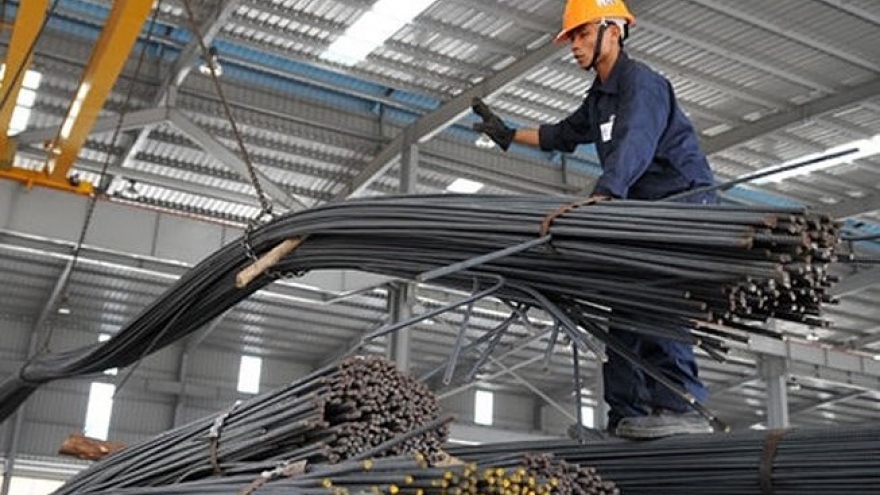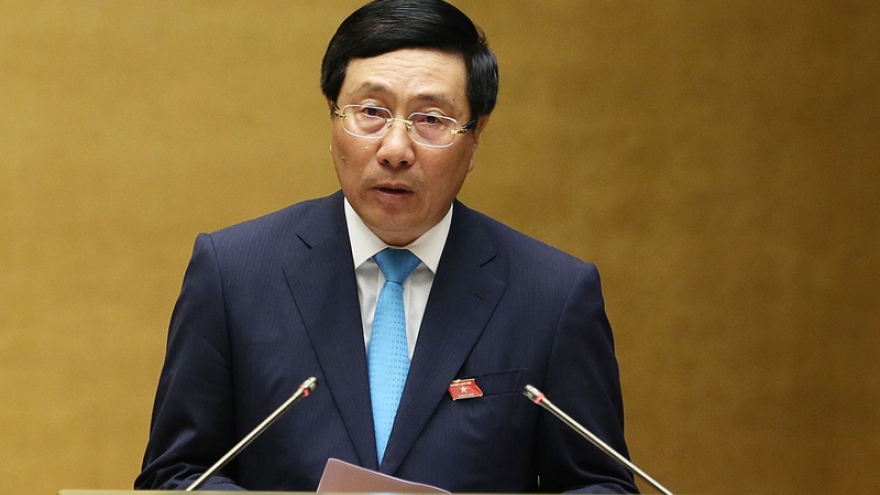Three sectors to reap benefits from trade spat
VOV.VN - The US-China trade war, poised to persist in the coming quarters, would stand Vietnamese sectors in good stead, a research entity has predicted.
 |
| (Source: Trademap, Fitch Solutions) |
According to Fitch Solutions, a macro-research unit of Fitch Group, countries with export-oriented manufacturing sectors and improving business environments will benefit from the ongoing US-China trade war, as it encourages major multinational firms to diversify their supply chains or shift out of China altogether.
The most significant moves are likely to be seen at the lower end of the value chain, including textiles and the assembly of simple electronics where supply chain density is less important given the more simplistic manufacturing required.
Vietnam’s garment and textile sector is enjoying additional investment inflows while Bangladesh and Ethiopia could see longer-term investment, Fitch Solutions experts believe.
Focusing on textiles, Vietnam stands out as the most immediate beneficiary of multinational firms’ efforts to diversify and maintain access to the US market. In recent years, the Southeast Asian country has attracted significant investment into its low-value added manufacturing, with investors finding its combination of low wages, relative political stability, rapidly developing transport, and improving regulatory environment attractive.
The continued trade tensions will likely spur further investment, not only due to the favourable business environment, but also the fact that manufacturers will prefer to ramp up production in locations that they already have operations, leveraging their current networks.
Vietnam is already the second largest exporter of apparel to the US, behind China, making it an obvious diversification option. Fitch Solutions has already seen this playing out to a certain extent, with firms like Brooks Sports and Asics having announced plans to move part of their shoe manufacturing into Vietnam in recent months.
Room to attract further investment inflows in the domestic garment and textile sector will be extended as the US has already announced plans to impose additional tariffs on Chinese goods to cover textiles and other final consumer products.
Meanwhile, Bangladesh also stands out as one of the best positioned to take the US market share in the coming quarters should rising costs begin to undercut Vietnam’s competitiveness. It is already a large-scale textile producer with a footprint in the US market, and has already seen an uptick in investment and exports from the trade war.
Bangladesh benefits from a lower minimum wages than most major textile producers currently serving the US market while its large working age populations, low tax and social security contributions for private firms and weak labour unions will likely keep labour costs low in the near term.
The Vietnamese ICT sector is expected to reap benefits from the trade war when it would potentially enjoy further shifts in supply chain dynamics in the coming quarters.
Vietnam appears to be a major winner in low-to-mid range ICT product manufacturing. The country is already a well-established electronics manufacturer and is currently the world’s second largest smartphone exporter, benefiting from US$17.0 billion in investment from Samsung alone since 2007, Fitch Solutions said.
In recent months, many firms such as Sharp, Nintendo, and Goertek have announced plans to shift more production into the country, moving to take advantage of the mix of low costs and the strong regulatory environment.
Similarly, with contract manufacturers such as Foxconn and Pegatron contemplating shifting more production out of China and into emerging Southeast Asia, Fitch Solutions assumes that Vietnam is positioned to benefit from further investment.
Mexico, Thailand and Indonesia are other potential beneficiaries, though likely to a lesser extent then Vietnam. Thailand is comparatively less oriented toward ICT manufacturing, though business-friendly policies, relative political stability and reform efforts – including the Industry 4.0 programme - could position it to benefit from increased higher-level manufacturing investment.
Additionally, Vietnam’s mining and metals sector is positioned for long-term benefits.
In the mining and metals space, by far the biggest impact will be on the production of rare earths minerals - 17 elements that are used in a number of highly strategic or technologically advanced products such as semiconductors, fibre-optic telecommunications, batteries and high performance magnets.
China currently holds a near-monopoly on the global supply of rare earth metals as it accounts for over 72 per cent of the global supply. Beijing could consider imposing restrictions or tariffs as part of the trade war with the US, Fitch Solutions said.
Increased attention and concern by US policymakers over China’s dominant position is likely to support a diversification of rare earths supplies. Indeed, Fitch Solutions has already seen US policymakers propose the legislation aimed at encouraging the domestic production of rare earths, while the US Department of Defense has asked for additional federal funds to do the same.
While Fitch Solutions does not believe that new facilities will be able to ramp up production in the next one-to-two years, the increased focus on the source of rare earth elements will likely see greater investment for those countries with sizeable reserves deposits, such as Brazil and Vietnam, as well as countries with smaller reserves and more developed projects, including Canada, Australia, and the US.


